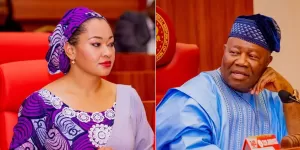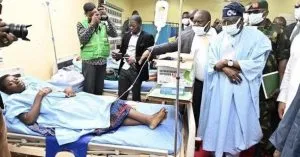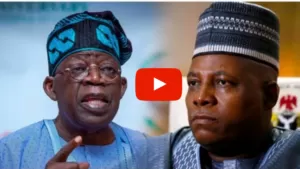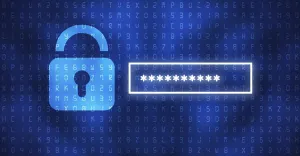PDP Governors’ Forum Resolves to Seek Supreme Court Interpretation on State of Emergency Provisions

By Our Correspondent, Ibadan – April 14, 2025
The Peoples Democratic Party (PDP) Governors’ Forum convened a crucial meeting in Ibadan, the Oyo State capital, on April 13-14, 2025, to deliberate on pressing party matters and the state of the nation. One of the key outcomes of the meeting was a unanimous resolution to approach the Supreme Court of Nigeria for a definitive interpretation of the constitutional provisions governing the declaration of a state of emergency, particularly in light of recent developments in Rivers State.
The meeting, hosted by Oyo State Governor Seyi Makinde, brought together governors from PDP-controlled states, including Ahmadu Fintiri (Adamawa), Umo Eno (Akwa Ibom), Ademola Adeleke (Osun), Bala Mohammed (Bauchi), Godwin Obaseki (Edo), Caleb Mutfwang (Plateau), Agbu Kefas (Taraba), and Dauda Lawal (Zamfara), among others. Also in attendance were party leaders, stakeholders, and representatives of the PDP National Working Committee.
The governors expressed deep concern over the federal government’s declaration of a state of emergency in Rivers State on March 18, 2025, by President Bola Ahmed Tinubu. The emergency rule led to the suspension of Rivers State Governor Siminalayi Fubara, his deputy, Prof. Ngozi Ordu, and the entire Rivers State House of Assembly. In their place, the President appointed a sole administrator to govern the state, citing the need to restore order amid political tensions.
The PDP governors, in a communiqué issued at the end of the meeting, described the President’s action as an overreach of executive power and a potential threat to Nigeria’s democratic framework. They argued that the declaration of a state of emergency under Section 305 of the 1999 Constitution (as amended) and related provisions requires clear conditions, such as a breakdown of public order or national security threats beyond the state government’s control. The governors contended that the situation in Rivers State did not meet these thresholds, accusing the federal government of exploiting the provision for political gain.
Legal Action to Clarify Constitutional Boundaries
To address these concerns, the PDP Governors’ Forum resolved to file a suit at the Supreme Court, seeking a judicial interpretation of the constitutional provisions for declaring a state of emergency. The suit, which will involve governors from states such as Adamawa, Enugu, Oyo, and others, aims to clarify whether the President has the authority to suspend elected officials, including the governor, deputy governor, and state assembly, under the guise of emergency rule.
A source close to the Forum revealed that the governors are particularly focused on Section 305, which outlines the procedure for proclaiming a state of emergency, as well as Sections 1, 11, and 45 of the Constitution, which emphasize the supremacy of the Constitution, the powers of the National Assembly, and restrictions on emergency powers, respectively. The legal challenge will also examine whether the appointment of a sole administrator violates the principles of federalism and the separation of powers enshrined in the Constitution.
Governor Seyi Makinde, speaking to journalists after the meeting, emphasized the importance of protecting Nigeria’s democracy. “We cannot sit idly by while actions that undermine the will of the people are taken. The Constitution is clear about the processes for governance, and we are seeking the Supreme Court’s guidance to ensure that no one, no matter how highly placed, acts above the law,” he said.
Rivers State Crisis as a Catalyst
The Rivers State crisis, which prompted the emergency declaration, has been a focal point of national discourse. The state has been embroiled in a prolonged political battle between Governor Fubara and factions loyal to his predecessor, Nyesom Wike, now the Minister of the Federal Capital Territory. The conflict has led to divisions within the state assembly, violent clashes, and disruptions in governance, culminating in the federal government’s intervention.
The PDP governors, however, argue that the crisis was exaggerated to justify the imposition of emergency rule. They pointed out that Governor Fubara had taken steps to restore calm and that the state’s security apparatus was capable of handling the situation without federal overreach. The governors also accused certain political actors of orchestrating the unrest to destabilize the PDP-led government in Rivers State.
Broader Implications for Nigerian Democracy
The decision to seek Supreme Court intervention has been hailed by analysts as a bold move to safeguard Nigeria’s democratic institutions. Constitutional lawyer Dr. Festus Ogun described the governors’ action as “a necessary step to prevent the erosion of federalism.” He noted that the Supreme Court’s ruling could set a precedent for how emergency powers are exercised in Nigeria, ensuring that such measures are not abused to suppress opposition or silence dissenting voices.
The PDP Governors’ Forum also used the Ibadan meeting to address internal party matters, including preparations for the 2027 general elections and strategies to strengthen the PDP’s national presence. The governors reaffirmed their commitment to unity within the party and promised to work with other opposition forces to promote good governance and accountability.
As the nation awaits the Supreme Court’s response to the PDP governors’ suit, all eyes are on the judiciary to uphold the rule of law and provide clarity on one of the most contentious issues in Nigeria’s constitutional history. The outcome of this legal battle could redefine the balance of power between the federal and state governments, with far-reaching implications for the country’s democratic future.







